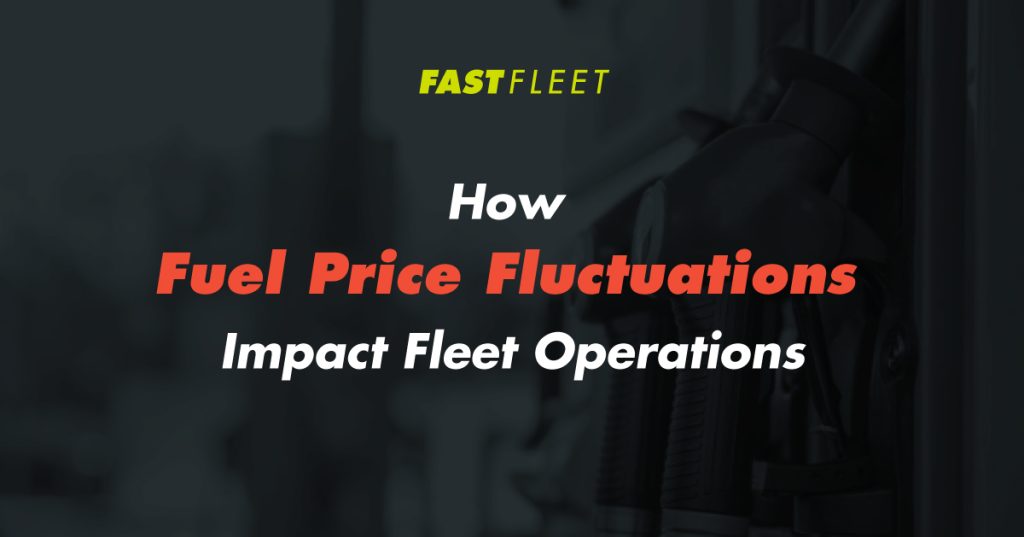Fuel prices are inherently volatile, influenced by various factors including geopolitical events, supply and demand dynamics, natural disasters, and market speculation.
This volatility can result in significant price swings over short periods, making it challenging for fleet managers to predict and manage fuel expenses effectively.
Importance of Understanding Their Impact on Fleet Operations
For fleet managers, understanding the impact of fuel price fluctuations is crucial. Fuel costs constitute a substantial portion of a fleet’s operating expenses.
Sudden increases can strain budgets, affect profitability, and force companies to make difficult decisions regarding route planning, service levels, and pricing strategies.
Effective management of these fluctuations is essential to maintain operational efficiency and financial stability.
Current Trends in Fuel Prices
Analysis of Recent Fuel Price Trends
Recent trends in fuel prices have shown a pattern of instability, with periodic spikes and drops.
Factors such as OPEC’s production decisions, changes in global oil supply due to political unrest, and fluctuations in demand due to economic conditions have all played significant roles.
The transition towards greener energy sources also influences fuel markets, creating uncertainty and variability.
Factors Contributing to Fuel Price Volatility
Several factors contribute to the volatility of fuel prices:
- Geopolitical Events: Conflicts and political decisions in oil-producing regions can disrupt supply.
- Economic Conditions: Global economic health impacts demand for fuel.
- Natural Disasters: Events like hurricanes can damage infrastructure and disrupt supply chains.
- Market Speculation: Traders’ actions in the oil futures market can drive price changes.
- Regulatory Changes: Government policies on energy can alter supply and demand dynamics.
Impact on Fleet Operations
Increased Operational Costs
Fuel price increases directly raise operational costs for fleets. These added expenses can erode profit margins, particularly for companies that rely heavily on fuel-intensive operations.
Higher fuel costs also affect the prices of goods and services, leading to broader economic impacts.
Effects on Budgeting and Financial Planning
Fuel price volatility complicates budgeting and financial planning. Fleet managers must account for potential price swings when setting budgets and forecasting expenses.
Unpredictable fuel costs can lead to financial strain and necessitate frequent budget adjustments.
Influence on Route Planning and Scheduling
Fluctuating fuel prices impact route planning and scheduling decisions.
To manage costs, fleets may need to optimize routes for fuel efficiency, reconsider delivery schedules, or even reduce service areas.
Efficient route planning becomes essential to mitigate the effects of high fuel prices.
Cost Management Strategies
Fuel-Efficient Driving Practices
Promoting fuel-efficient driving behaviors among drivers can significantly reduce fuel consumption.
Maintaining steady speeds, avoiding excessive idling, and using cruise control can help optimize fuel use and lower costs.
Regular Vehicle Maintenance
Regular maintenance ensures that vehicles operate at peak efficiency, reducing fuel consumption.
This includes routine checks of tire pressure, engine tuning, and timely replacement of air filters and other critical components that affect fuel efficiency.
Use of Fuel Management Systems
Fuel management systems provide real-time data on fuel usage, helping fleet managers monitor consumption and identify areas for improvement.
These systems can track fuel purchases, detect inefficiencies, and support strategic planning to reduce overall fuel costs.
Alternative Fuels and Technologies
Benefits of Electric and Hybrid Vehicles
- Electric and hybrid vehicles offer significant fuel savings and environmental benefits.
- They reduce dependence on traditional fuels and can lower operational costs in the long run.
- The use of these vehicles can also enhance a fleet’s sustainability profile.
Adoption of Alternative Fuels (e.g., Biodiesel, LNG)
Alternative fuels such as biodiesel and liquefied natural gas (LNG) provide viable options for reducing fuel costs and emissions.
These fuels can be more stable in price and offer environmental advantages, making them an attractive option for forward-thinking fleets.
Government Incentives and Regulations
Government incentives, such as tax credits and grants, can offset the initial costs of adopting alternative fuels and advanced vehicle technologies.
Additionally, understanding and complying with regulations related to fuel use and emissions is crucial for leveraging available benefits and avoiding penalties.
Adapting to Fuel Price Changes
Dynamic Pricing Strategies for Clients
Implementing dynamic pricing strategies allows fleet managers to adjust their pricing based on fluctuating fuel costs.
This ensures that increased expenses are passed on to clients, helping to maintain profitability.
Transparent communication with clients about these adjustments can build trust and understanding.
Long-Term Contracts and Hedging
Entering into long-term contracts with fuel suppliers can stabilize fuel costs and protect against price spikes.
Additionally, using financial instruments like fuel hedging can help lock in prices and reduce the impact of market volatility on the fleet’s operating budget.
Collaboration with Fuel Suppliers
Building strong relationships with fuel suppliers can lead to better pricing and more favorable terms.
Collaboration can also provide fleets with insights into market trends and access to alternative fuel options, enhancing overall fuel management strategies.
Recap of Key Strategies for Managing Fuel Price Fluctuations
Managing fuel price fluctuations involves adopting dynamic pricing strategies, securing long-term contracts, leveraging fuel hedging, and collaborating closely with fuel suppliers.
These approaches help fleets navigate the challenges of volatile fuel prices and maintain operational efficiency.
Final Thoughts on Maintaining Fleet Efficiency Amidst Changing Fuel Prices
Staying proactive and adaptable is essential for fleet managers facing fluctuating fuel prices.
By implementing comprehensive fuel management strategies, fleets can achieve cost stability and operational resilience, ensuring long-term success.
Fast Fleet Roadside Service is here to support your fleet’s efficiency and reliability.
Our 24/7 roadside assistance, expert maintenance services, and comprehensive fleet solutions are designed to keep your operations running smoothly, even in the face of fluctuating fuel prices.
Contact us today to learn more about how we can help your fleet thrive. Visit our website or call us now to get started!
















